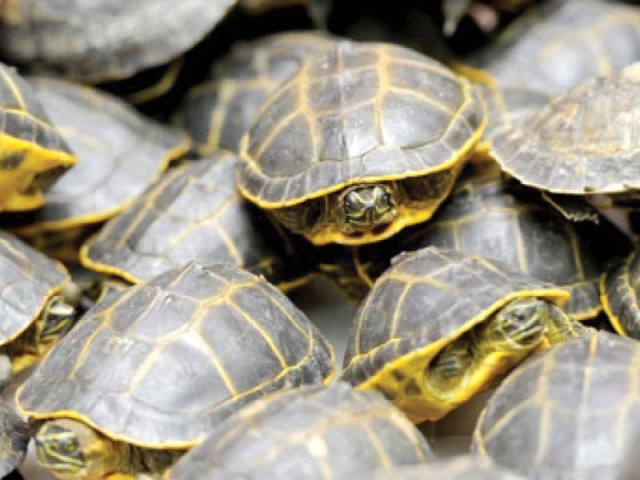'Govt to stamp out illegal wildlife trade'
Situation of illicit wildlife trafficking highly upsetting

Around the globe, wildlife is being bought and sold on an increasingly colossal scale. PHOTOS: FILE
This was said by PML-N parliamentarian Moeen Wattoo on Wednesday at a national consultative policy workshop on “Tackling illegal wildlife trade in Pakistan through a national monitoring network”.
It was organised by the Ministry of Climate Change in collaboration with the World Wildlife Fund for Nature-Pakistan (WWF-Pak) and others.
He urged stakeholders to join the government’s efforts.
“Protecting wildlife from all sorts of threats is a top priority of the government, particularly the problem of the illicit wildlife trade, which has shown an unprecedented spike,” the MNA said.
WWF calls for crackdown on illegal wildlife trade in Pakistan
The day-long event aimed at reviewing key recommendations of the draft National Plan of Action (NPA) to Combat Illegal Wildlife Trade in Pakistan, and seeking and deliberating over suggestions of experts from the Management Committee of Pakistan for the Convention on International Trade in Endangered Species of Wild Fauna and Flora on it.
The workshop was part of the consultative and training series conducted as part of the project “Combating illegal wildlife trade” by establishing a national monitoring network that benefits local communities and environment.
Wattoo observed that wildlife trade was the most pressing threat to animals in many parts of the world including Pakistan.
Around the globe, wildlife was being bought and sold on an increasingly colossal scale as pets, meat, food, medicine, furs, feathers, skins and trophies.
Globally illicit wildlife trafficking was valued at billions of dollars per year, behind only narcotics and illegal arms trades and the situation in Pakistan was highly upsetting, he remarked.
“Because, the wildlife species worth billions of dollars continue to be unlawfully trafficked to different countries from Pakistan too because of weak implementation of relevant laws, lack of technology and lack of capacity of relevant government departments including security agencies,” Wattoo argued.
Wildlife crimes destablising country’s ecosystems
The parliamentarian also apprised the participants about the Prime Minister’s Green Pakistan Programme (GPP) saying that besides increasing tree cover, it aimed to protect wildlife species and strengthen institutional capacity of the government departments.
Prime Minister’s Focal Person on Climate Change Syed Rizwan Mehboob stressed to dismantle supply chain of illegal wildlife trade in the country.
He also suggested the policy makers to mull over ways to tackle key causes of the wildlife trade, particularly poverty and joblessness, and offer incentives to local communities for supporting government’s efforts in addressing illegal wildlife hunting and trade.
“Raising awareness among relevant stakeholders, capacity building of law enforcement agencies, custom officials and convincing them about severity and fallouts of illegal wildlife trade is critical to efforts aimed at weeding out wildlife trade,” Mehboob said.
IG Forests Syed Mahmood Nasir in his inaugural address said that illegal wildlife trade was recognised as the second biggest threat to wildlife after habitat loss.
The global illegal trade is estimated to generate $23 billion annually, he said.
WWF-Pak Director-General Hammad Naqi Khan termed the NPA an excellent opportunity to further strengthen the knowledge and skills of law-enforcement agencies and to develop partnerships among them to effectively curb wildlife crimes.
Earlier, Humaira Ayesha of the WWF-Pak gave a detailed presentation on the key components of the draft NPA and informed that it included recommendations to improve and strengthen existing legislation dealing with wildlife trafficking in the country and to review penalties for wildlife crimes.
Published in The Express Tribune, August 25th, 2016.



















COMMENTS
Comments are moderated and generally will be posted if they are on-topic and not abusive.
For more information, please see our Comments FAQ